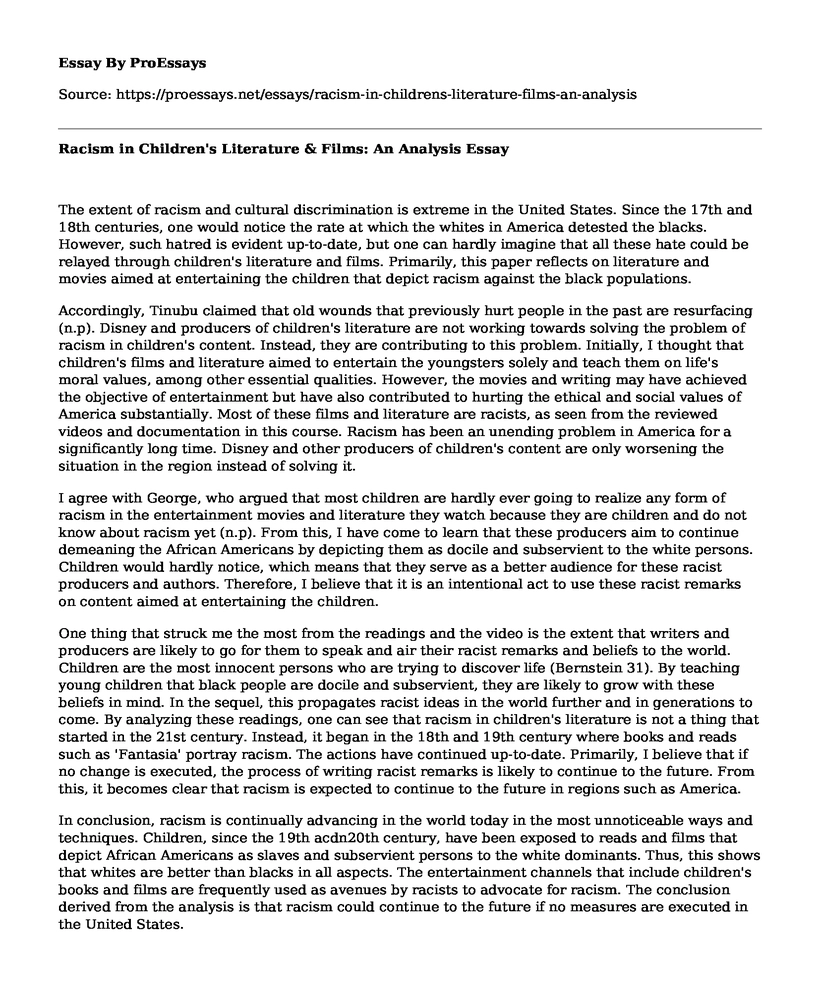The extent of racism and cultural discrimination is extreme in the United States. Since the 17th and 18th centuries, one would notice the rate at which the whites in America detested the blacks. However, such hatred is evident up-to-date, but one can hardly imagine that all these hate could be relayed through children's literature and films. Primarily, this paper reflects on literature and movies aimed at entertaining the children that depict racism against the black populations.
Accordingly, Tinubu claimed that old wounds that previously hurt people in the past are resurfacing (n.p). Disney and producers of children's literature are not working towards solving the problem of racism in children's content. Instead, they are contributing to this problem. Initially, I thought that children's films and literature aimed to entertain the youngsters solely and teach them on life's moral values, among other essential qualities. However, the movies and writing may have achieved the objective of entertainment but have also contributed to hurting the ethical and social values of America substantially. Most of these films and literature are racists, as seen from the reviewed videos and documentation in this course. Racism has been an unending problem in America for a significantly long time. Disney and other producers of children's content are only worsening the situation in the region instead of solving it.
I agree with George, who argued that most children are hardly ever going to realize any form of racism in the entertainment movies and literature they watch because they are children and do not know about racism yet (n.p). From this, I have come to learn that these producers aim to continue demeaning the African Americans by depicting them as docile and subservient to the white persons. Children would hardly notice, which means that they serve as a better audience for these racist producers and authors. Therefore, I believe that it is an intentional act to use these racist remarks on content aimed at entertaining the children.
One thing that struck me the most from the readings and the video is the extent that writers and producers are likely to go for them to speak and air their racist remarks and beliefs to the world. Children are the most innocent persons who are trying to discover life (Bernstein 31). By teaching young children that black people are docile and subservient, they are likely to grow with these beliefs in mind. In the sequel, this propagates racist ideas in the world further and in generations to come. By analyzing these readings, one can see that racism in children's literature is not a thing that started in the 21st century. Instead, it began in the 18th and 19th century where books and reads such as 'Fantasia' portray racism. The actions have continued up-to-date. Primarily, I believe that if no change is executed, the process of writing racist remarks is likely to continue to the future. From this, it becomes clear that racism is expected to continue to the future in regions such as America.
In conclusion, racism is continually advancing in the world today in the most unnoticeable ways and techniques. Children, since the 19th acdn20th century, have been exposed to reads and films that depict African Americans as slaves and subservient persons to the white dominants. Thus, this shows that whites are better than blacks in all aspects. The entertainment channels that include children's books and films are frequently used as avenues by racists to advocate for racism. The conclusion derived from the analysis is that racism could continue to the future if no measures are executed in the United States.
Works Cited
Bernstein, Robin. Racial Innocence: Performing American Childhood and Race from Slavery to Civil Rights. New York: New York University Press, 2012. Print.
George, Kat. "The disney movies you grew up with are incredibly racist." VH1 News, 9 Jan. 2015, www.vh1.com/news/310/racist-disney-movies/.Tinubu, Aramide A. "Disney's racist cartoons won't just stay hidden in the vault. But they could be used as a teachable moment." NBCNews.com, NBCUniversal News Group, 18 Nov. 2019, www.nbcnews.com/think/opinion/disney-s-racist-cartoons-won-t-just-stay-hidden-vault-ncna998216.
Cite this page
Racism in Children's Literature & Films: An Analysis. (2023, May 30). Retrieved from https://proessays.net/essays/racism-in-childrens-literature-films-an-analysis
If you are the original author of this essay and no longer wish to have it published on the ProEssays website, please click below to request its removal:
- Big Data Analytics the Challenges and Opportunities
- Paper Example on Data Types and Structures
- Essay Sample on Significance of Big Data and Information Systems For: Machine, Platform and Crowd
- Data Screening: Goals, Outliers & Missing Data - Essay Sample
- Psychological Difficulties Linked to Problematic Internet Usage Among Young Individuals - Essay Sample
- Effective INT Data Collection: Improving Skills to Categorize PIRs - Essay Sample
- Macbeth & Lady Macbeth: Contrasting Degrees of Evilness







